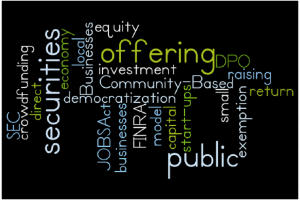 important debate of a lifetime. It’s time to set capital free of governments and banks,” Crowdfund Insider readers have the opportunity below to read highlights from the enthralling debates.
important debate of a lifetime. It’s time to set capital free of governments and banks,” Crowdfund Insider readers have the opportunity below to read highlights from the enthralling debates. The Crowdfunding Centre’s Founder and Chairman Barry James graciously began, “Firstly thank you for agreeing to extend the deadline to encompass the Deep Impact conference held on 13th Nov. This enables us to provide this open summary of key points from the debate to help inform the process of re-regulation which the Chancellor announced 6th August in his speech at InnovateFinance.”
The Crowdfunding Centre’s Founder and Chairman Barry James graciously began, “Firstly thank you for agreeing to extend the deadline to encompass the Deep Impact conference held on 13th Nov. This enables us to provide this open summary of key points from the debate to help inform the process of re-regulation which the Chancellor announced 6th August in his speech at InnovateFinance.”“However it should be noted that there was little or no confidence that the FCA is prepared to take account of or respond to comments or criticism via consultations or elsewhere. We would like to help remedy this and make various suggestions below to this end,” stated James. “While the protection of consumers from vendors of financial products seeking to prey upon citizens is a given this must not create a situation where freedoms are curtailed and citizens prevented for making their own choices. The costs in terms of both the overall financial cost, to the economy as a whole, and opportunity and innovation cost must now be factored into proposed changes.”
1. The biggest issue is the need for clarity and greater simplicity.
“While this is essential we do not believe this is achievable given the current approach. Anything less is not fit
for purpose. It must be made clear to whom the rules apply and what restrictions the FCA seek to place on them. The current proposals do not do this. Their complexity defeats their objective. As Simon Brickles, the Architect and ex-CEO of AIM, pointed out such clarity is certainly achievable given sufficient commitment, as it was for the AIM market. Clear, self contained, rules that can be construed by an intelligent layman rather than an abstruse tangle of interwoven and heavily cross referenced materials that is difficult for even specialist professionals to construe. We are willing to provide further submissions and guidance if requested to this end,” stated James.
2. The Status-Quo must be restored making it clear that only commercially motivated paid advertisements made ‘in the course of business’ by professionals (or others) offering financial products for gain are ‘captured’ by regulations.
“What is ‘in the course of business’ must also be clearly defined – and to restore the status-quo must clearly exclude:
1 Opinions & Comment
2 Mentioning and Signposting
3 Non-Commercial Endorsements (such as the recent one by the Deputy Prime Minister)
4 Those not gaining financially from such messages – including friends, family etc
The possibility of mass civil disobedience was raised during the debate and discussed with some feeling that this should be reserved as an option to ensure the personal and financial freedoms of citizens are not infringed. Also that since citizens use of social media could not be ‘effectively policed’ attempts to do so run the risk of ‘bringing the entire process into disrepute,'” averred James.
3. The position of all the key actors in a crowdfund, apart from the authorised platform (including entrepreneurs/teams & staff, friends & family, existing backers, potential backers and others) should be clearly identified and where an obligation is placed on them this should made clear and explicit.
• Platform / Staff (personally and professionally)
• Issuers: Entrepreneurs / Team & Staff (personally and professionally)
• Existing Backers / Investors
• Prospective Backers / Investors – including Friends & Family
• Those with no pre-existent relationship
• Others
“This is not currently the case,” summed up James.
4. Safe Harbours
“For those on whom such an obligation is placed it is possible and would be highly beneficial to define a series of ‘safe harbours’ whereby certain permissible wording could be adopted,” averred James.
5. Regulated single point of sale and for authoritative information
“Authoritative information is publicly available from a regulated single point of sale (website) which is fully auditable: The crowdfunding platform. This is a very different model, which is simpler and easier to regulate and is already regulated,” shared James. “There is therefore no necessity to regulate any of (1) to (4) above and doing so provides no additional  consumer protection but adds large and difficult to quantify costs as well as curtailing citizens freedoms and tending to limit, restrict and dampen innovation.”
consumer protection but adds large and difficult to quantify costs as well as curtailing citizens freedoms and tending to limit, restrict and dampen innovation.”
6. Stand-alone Compliance
“While this approach has clear advantages for the regulator itself, given that the regulator exists to support the market not vice versa this is an unreasonable and unworkable approach which creates a huge amount of unnecessary friction, limiting innovation and market development. It is clearly unnecessary given the above. There is a growing perception that such approaches signal an unstated unwillingness to engage with media such as Twitter given its nature and restriction to 140 characters. This has been characterised as ‘disingenuous’ and ‘implying twitter should not be used but lacking the willingness to explicitly state this,”‘ indicated James.
7. The current regulatory approach risks making Crowdfunding less safe
“Crowdfunding is fundamentally and philosophically different to other investing. It is an emergent ‘bottom up’ not ‘top  down’ activity. This is different in character, so has different characteristics which need to be understood fully in order to regulate effectively. Otherwise regulation may make it less safe as well as damaging this promising new market and driving out innovation,” James continued. “For example, experience has proven that the crowd provide a high degree of scrutiny and expose inconsistency and potential fraud early. The likelihood of discovery and exposure also provides a highly efficient deterrent. Regulation that reduces transparency (by restricting scrutiny to fewer potential investors for example) or reduces conversation / information flow (by restricting use of social media by non-issuers / vendors) reduces scrutiny and so increases risk.”
down’ activity. This is different in character, so has different characteristics which need to be understood fully in order to regulate effectively. Otherwise regulation may make it less safe as well as damaging this promising new market and driving out innovation,” James continued. “For example, experience has proven that the crowd provide a high degree of scrutiny and expose inconsistency and potential fraud early. The likelihood of discovery and exposure also provides a highly efficient deterrent. Regulation that reduces transparency (by restricting scrutiny to fewer potential investors for example) or reduces conversation / information flow (by restricting use of social media by non-issuers / vendors) reduces scrutiny and so increases risk.”
8. An Invitation / Submissions to Treasury Ministers
“We invite the FCA to meet with a delegation from the conference asap to discuss these points in more detail and our forthcoming submission to Treasury ministers providing a positive opportunity to engage toward a more workable application of FSMA and a regime for ‘financial promotions’ as they relate to social media,” engaged James.


